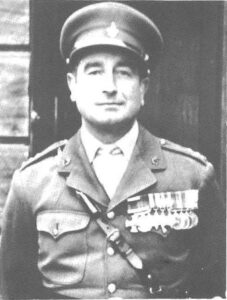Pat de Clermont was one of those ebullient characters who were almost larger than life, filling every ‘unforgiving minute’ with an enthusiastic vitality that often left his friends bemused.

He was a man of many parts but was first and last an 8th Hussar; from the moment he joined until the end of his life his devotion to the Regiment and his concern for the welfare of its members remained undiminished.
Patrick Howard Voltelin de Clermont was born in 1912, a nephew of Brigadier Van der Byl who was Colonel of the 8th Hussars from 1930 to 1948.
Educated at Harrow and Sandhurst he was commissioned into the Regiment in 1932 when they were in Egypt.
He soon made his presence felt in both military and civilian circles, and a cabaret act he performed in those early days with two fellow officers became the most popular entertainment among the sophisticates of Cairo society.
In 1937 he left the Army to look after his family firm of leather merchants, but on the outbreak of war in 1939, he was recalled from the Reserve List and after a short spell on the staff of 7th Armoured Brigade rejoined the Regiment, by now in the Western Desert.
He was appointed Adjutant and served with distinction, being twice Mentioned in Despatches, until his capture, along with so many of the 8th Hussars, at the battle of Sidi Rezegh and was taken to a POW camp in Italy.
With the collapse of Italy in September 1943 the POWs left their camps and though many were recaptured by the Germans, by then in control of the country. Pat de Clermont and the Quartermaster, Charlie Hedley, managed to avoid that fate.
Hedley was a sick man and after virtually carrying him across the Apennines that winter and thereby saving his life, Pat and he spent many months avoiding the Germans until they found an escape route into Allied hands.
Pat returned to the Regiment as Adjutant to Lieut-Colonel Desmond Fitzpatrick just before crossing the Rhine and became Second-in-Command in April 1945.
The following year he attended the Canadian Staff College, after which he returned to England and a staff appointment in the War Office.
A posting to Turkey followed, as Assistant Military Attache in Ankara, before rejoining the Regiment in 1950 just in time to go to Korea.
In that difficult, confused and bitter war, which saw the first Centurions in action, Pat commanded ‘A’ Squadron with vigour and panache, and was awarded the DSO in April 1952 for ‘valiant and distinguished service’.
Back in England, he enjoyed a short spell with the Yorkshire Hussars before taking up another staff appointment in the War Office, and in November 1953 he took over command of the 8th Hussars from Lieut-Colonel Sir (William) Guy Lowther Bt in Luneburg.
His time in command allowed Pat to give free rein to his flamboyance and enthusiasm, encouraging others to excel in their work and their sport and enjoy both as much as he did.
His hospitality was unstinted and he forged firm links with the other regiments in the garrison who responded instantly to his exuberant, and often unorthodox, way of life. From his high-speed dashes to Celle, 40 miles distant, on a powerful motor-cycle, black leather-clad, to inspect the racehorses in training before returning for first parade, to acting as Server, correct in cassock and surplice, in the Regimental Chapel, his activities were prodigious, but with them, all his paramount dedication was a concern for the Regiment and its members.
On his retirement, Pat and his wife, Elizabeth (Liz) who he married in 1948, settled on the Scottish border and he turned his attention to country pursuits, particularly his fishing on the Tweed, which gave him the greatest pleasure, and also to the breeding of pigs and sheep which won him many awards.
At his right hand in all these activities, he had the good fortune to have ex-RSM Tom Hegarty, the last Weedon-trained riding instructor in the 8th Hussars, who gave him devoted assistance throughout those busy years.
Pat enjoyed the good things of life to the full, but he got equal enjoyment from enabling others to share in his activities and interests.
His generosity was proverbial and there can be few members of the Regiment ever in need who did not benefit from his helping hand, and for this, he will be remembered by many whose life he lightened or enriched.


